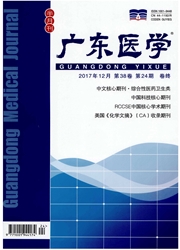

 中文摘要:
中文摘要:
目的探讨消化性溃疡(PU)患者生活质量的影响因素。方法采用SF-36量表作为调查工具,对142例PU住院患者生活质量进行测评。以年龄、性别、民族、劳动性质、婚姻、医疗支付方式、经济状况、文化程度、治疗方法、溃疡部位为自变量,以生理功能(PF)、生理职能(RP)、躯体疼痛(BP)、一般健康状况(GH)、生命力(VT)、社会功能(SF)、情感职能、精神健康等8个领域得分及躯体综合总分、心理综合总分(MCS)等2个综合总分为因变量,利用逐步线性回归进行多因素分析,探讨PU患者生活质量的影响因素。结果除了民族、溃疡部位以及劳动性质(脑力劳动者、其他)以外,其余因素对某些领域得分或综合总分的影响有统计学意义,其中文化程度对MCS和PF、VT得分的影响有统计学意义(P〈0.05),经济状况对MCS和GH、SF得分的影响有统计学意义(P〈0.05)。未发现对BP和RP得分的影响有统计学意义的因素。结论文化程度和经济状况是影响PU患者生活质量的重要因素。找出影响PU患者生活质量的因素并探讨其作用方式,可以为早期预防和治疗以及提高PU患者生活质量提供科学依据。
 英文摘要:
英文摘要:
Objective To analyze the influence factors of quality of life (QOF) in patients with peptic ulcer. Methods The SF -36 was used to measure the QOF in 142 patients with peptic ulcer, and multivariate stepwise linear regression was used to analyze their influence factors with age, gender, nationality, labor category, marriage, medical payment, economic condition, education level, treatment methods and ulcer location being as the independent variables, while the domains scores and two summary scores as the dependent variables. Results All factors, except for nationality, ulcer location and labor category (brain workers and others), more or less affected some domains or summary scores. Ed- ucation level significantly affected mental component summary (MCS) , physical function and vitality (P 〈 0. 05 ) ; while economic condition had significant effects on general health and social function MCS ( P 〈 0. 05 ). No influent factor on domains of bodily pain and role - physical was found. Conclusion Education level and economic condition are two important influence factors on QOF in patients with peptic ulcer. To find out the influence factors on QOF and explore their mechanisms can provide scientific basis for early prevention and treatments for patients with peptic ulcer and improve their QOF.
 同期刊论文项目
同期刊论文项目
 同项目期刊论文
同项目期刊论文
 Development and Validation of the General Module (QLICD-GM) of the System of Quality of Life Instrum
Development and Validation of the General Module (QLICD-GM) of the System of Quality of Life Instrum Development and Validation of a Quality of Life Instrument for Patients with Drug Dependence: Compar
Development and Validation of a Quality of Life Instrument for Patients with Drug Dependence: Compar 期刊信息
期刊信息
